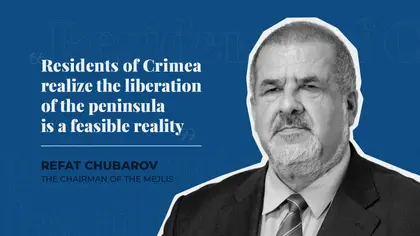The date Jan. 20 has been marked as Crimea Day in Ukraine since 1993. But in five weeks’ time Ukraine will mark another sad anniversary – that of Russia’s occupation of Crimea in spring 2014.
To mark the occasion, Kyiv Post spoke to Refat Chubarov, chairman of the Mejlis and deputy chairman of the Representative Council of the Crimean Tatar People.
JOIN US ON TELEGRAM
Follow our coverage of the war on the @Kyivpost_official.
He said that Ukraine’s borders must return to those of August 1991, which means recapturing Crimea, and that the bluff by Russia that it would use nuclear weapons had not worked.
Chubarov confirmed continued violence and repressions by Russian authorities against Crimean Tatars which, he said, had risen sharply in recent months.
What is the situation like in Crimea? Is there any information that suggests the occupiers are making preparations for de-occupation?
In the summer of 2022, Crimea became a targeted territory. In particular, Ukrainian forces struck a military airfield near Saki, destroying nearly 50 modern Russian jet fighters.
There were powerful explosions at ammunition depots near Dzhankoi and a UAV attack on Russia's Black Sea Fleet headquarters in Sevastopol.
These and other actions have made residents of Crimea realize that the liberation of the peninsula is not just a wish of the Ukrainian leadership but a feasible reality.

Zelensky Meets CIA Director William Burns in Ukraine
Are there now fewer Russians in Crimea than before?
It is estimated that about one million Russian citizens have moved to Crimea.
They were certain that the peninsula was Russian for good, but now they are coming to realize that their future there is at risk, so the number of those wishing to settle in Crimea has fallen to zero.
Besides, many are trying to sell their property and leave the peninsula. And those who lived there prior to the occupation in 2014 and did not resist the occupiers, awaiting positive changes, are also coming to their senses.
They understand that Russia's occupation has created more problems for them and that their life is in jeopardy, because military action is very likely to take place in Crimea.
In 2022, those who are committed to the Ukrainian state – ethnic Ukrainians and Crimean Tatars – rekindled their hopes that Crimea would eventually return to Ukraine's fold.
Seeing that, the Russian occupiers are trying to use every means possible to keep the Crimean population under control.
They try to convince the people that Crimea cannot be breached by the Armed Forces of Ukraine.
So, the closer that the war gets to Crimea the greater the level of repressions and clampdowns.
The persecution of Crimean Tatars was stepped up after Feb. 24, 2022 and the situation with human rights was significantly aggravated by numerous multiple murders, abductions, illegal detentions, etc.
There were numerous reports last year of Russian officials leaving the peninsula. Have they returned? Are many of them still there?
The majority of these officials are still there, but they understand that they will have to leave. Those who have the resources are preparing fallback positions in Russia and moving their families there.
We have information about Russian officials and local collaborators buying property on Russian territory, which suggests they are going to flee.
What should be done with the Russians that have settled in Crimea?
We need to proceed exclusively from our own legislation. Crimea is an occupied territory.
Under Ukrainian law, any actions taking place there that are contrary to Ukrainian legislation are legally null and void.
Those persons who settled in Crimea when it was de facto beyond the control of the Ukrainian state acted in accordance with the rules and laws imposed by the occupying power in violation of international law.
Therefore, they will have no other option but to leave Crimea.
But there are different situations.
For example, a Russian girl who married a local man in Crimea may seem to have the right to live with him there. Yet, she married him in breach of Ukrainian law.
Yes, she did have the right to marry, but she should have done so in accordance with Ukrainian law, so she must also leave Crimea.
Then she must return to Ukraine, explain her situation, and ask for permission to enter the country which at one time she entered illegally.
You can also highlight the text and press Ctrl + Enter






